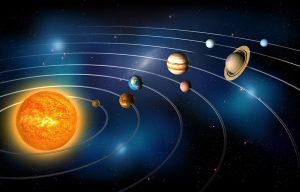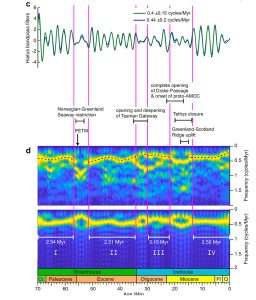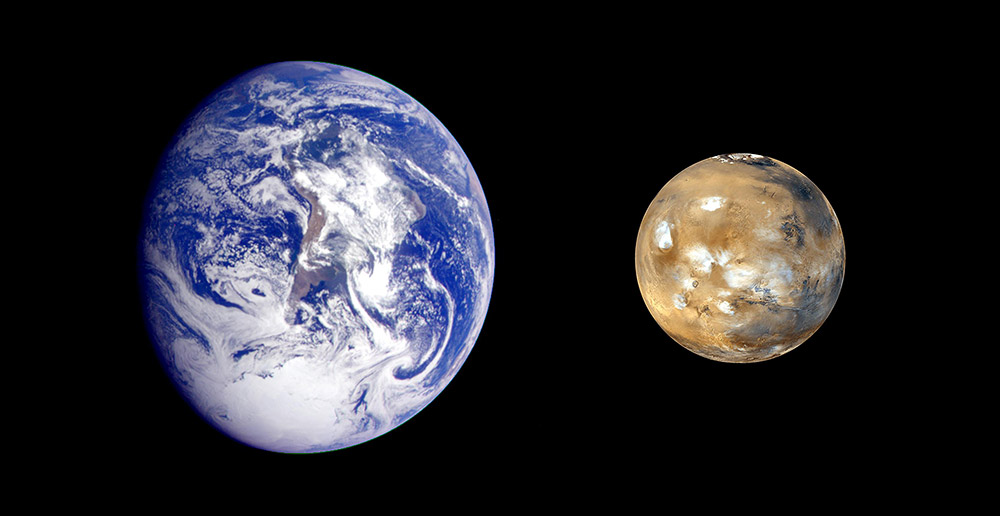Mars attracts: A study reveals that our neighboring planet Mars still has a subtle but profound influence on Earth today, shaping our climate and reaching the depths of the oceans. These planetary effects occur because Mars' orbit changes slightly on a regular cycle of about 2.4 million years. This leads to resonant effects in Earth's orbit, temporarily bringing our planet closer to the Sun and affecting Earth's climate.
The Earth does not orbit in space in isolation: it is part of a complex system of interacting celestial bodies – from the Moon to neighboring planets to the Sun. For example, the positions of the planets affect the activity of the Sun, while periodic fluctuations in the planets' orbits create resonant effects in their neighbors.

The Earth and its climate are also shaped by such astronomical influences: periodic changes in the Earth's orbit – so-called Milankovitch cycles – are, for example, a contributing factor to ice ages. The eccentricity of the Earth's orbit changes in cycles of about 100,000 and 405,000 years, and the tilt of the Earth's axis fluctuates every 21,000 years.
The periodic influence of Mars and its orbit
But there is another cycle that shapes our climate – and our neighbor Mars is the deciding factor in it, as a team from Adriana Dutkiewicz of the University of Sydney has discovered. The first indications of this Martian influence have already been provided by some striking periodic changes in geological deposits. These indicate climate changes in a cycle of about 2.4 million years.
The most likely explanation here is also a slight change in the eccentricity of Earth's orbit due to external gravitational effects. “This 2.4 million-year cycle is associated with the precession of the points closest to the Sun on Earth and Mars,” the researchers explain.
These perigee points change their location along the planet's orbits over time, meaning that the two planets' gravitational influence on each other also varies. Every 2.4 million years, the Earth moves a little closer to the Sun.
Warmer climate, increased deep currents and erosion
But how does this Martian influence affect our planet? To illustrate this, Dutkiewicz and her colleagues evaluated data from 293 deep-sea drilling operations around the world. The rock layers found in these cores date back 70 million years and come from all marine regions around the world. On the one hand, the team looked for evidence of regular 2.4 million-year cycles in these sediments. On the other hand, they wanted to know whether particularly profound phases of change could also be linked to these cycles.
In fact, there was a clearly detectable effect: “Our analysis shows periodic phases of strong erosion caused by deep-sea ocean currents, which are associated with orbital cycles lasting about 2.4 million years,” Dutkiewicz and her team said. In the past 70 million years, there have been four long phases in which these deep currents increased approximately every 2.4 million years and then calmed down again.
Closer analyzes showed that these phases of particularly strong deep currents and the associated erosion always occurred when Earth's orbit became more eccentric due to the influence of Mars. “This in turn caused increased solar radiation and seasonality,” the researchers explained. The result: The peaks of this 2.4-million-year cycle often coincided with particularly warm climate periods in Earth's history.

There were also “menstrual disorders”
However, there were also several phases in the last 70 million years in which the regular cycle was interrupted, the core data showed. “One notable episode of this circulation disruption was the Paleocene and Eocene thermal maximum about 56 million years ago,” the team says. At that time, average global temperatures rose by five to six degrees, and even the poles were free of ice. However, the cause of this drastic warming is controversial, with undersea volcanic eruptions, comet impacts and methane emissions being debated.
Dutkiewicz now suggests astronomical factors as an additional trigger: as they determined using astrophysical models, there was a chaotic change in the orbits of many planets in the inner solar system at that time. The resulting gravitational perturbation may also have changed Earth's orbit and, as a result, its climate.
Other disturbances in Mars' 2.4 million-year cycle coincided with tectonic changes on Earth. About 34 to 30 million years ago, several ocean passages opened, including the Drake Passage in southern South America and the Tasman Strait. “This linked all major oceans together and profoundly affected global ocean circulation,” the researchers explain.
Strong currents despite warm oceans?
Also interesting: “Our deep-sea data suggest that warmer oceans coincided with periods of strong deep-sea circulation,” says Dutkiewicz. At first glance, this seems to contradict data showing that global ocean circulation tends to weaken during warm periods – as it currently does due to climate change. Consequently, the melting of polar ice masses and the influx of meltwater affect the “circulation pumps” of large ocean currents.
“But the melting and freezing of sea ice is not the only mechanism affecting deep-sea circulation,” emphasizes co-author Dietmar Müller from the University of Sydney. Because if the climate becomes warmer – for example due to the influence of Mars – and there is more energy in the atmosphere and oceans, there will be more and stronger storms and disturbances in the seas. This in turn enhances currents and erosion on the seafloor, Müller explains.
This may also play a role in our current climate future: deep ocean currents may remain more stable than previously assumed, even as climate change advances. “This effect can prevent the sea from completely stagnating, even if the Atlantic overturning current weakens or stops completely,” explains Müller. (Nature Communications, 2024; doi: 10.1038/s41467-024-46171-5)
Source: University of Sydney
March 14, 2024 – Nadia Podbrigar

“Social media evangelist. Baconaholic. Devoted reader. Twitter scholar. Avid coffee trailblazer.”








More Stories
Longest jets in the universe discovered – giant particle streams as long as 140 Milky Way galaxies in a row
New method reveals 307 supernova remnants
Snapchat is upping the ante on augmented reality glasses